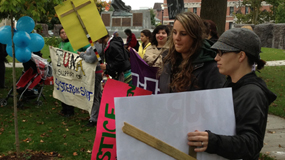
Co written by Brea Hutchinson
A review of Canada’s standing human rights record has generated 162 recommendations for Canada to improve upon its record. Canada has accepted all but 40 recommendations. The majority of the rejected recommendations fall into three primary categories: implementing the Convention on the Rights of the Child, ending violence against indigenous women and girls, and honouring the United Nations Declaration on the Rights of Indigenous Peoples (UNDRIP).
A Universal Periodic Review (UPR) is conducted every four years for all United Nations member countries. The review for Canada included presentations from more than 45 civil society organizations, including the Canadian Civil Liberties Association, Amnesty International, and Human Rights Watch. Upon hearing submissions brought forth by these organizations, 82 countries made statements and gave recommendations to the report.
Recommendations are concise statements made by state delegates, requesting single-issue change. For example, Canada accepted the recommendation by Vietnam that it should “make further efforts in the fight against all forms of discrimination and intolerance.” Although these recommendations carry no legal status and are voluntarily adopted by states, the process is hoped to increase long-term advocacy and dialogue at a national level.
The Harper government has been skeptical of UPRs because they allow countries with suspicious human rights records to criticize those of Canada. This criticism has been emphasized by popular Canadian media, particularly regarding the input of countries such as Belarus, Iran, and Cuba, as opposed to reporting the actual content of the recommendations. Appearing inconsistent, Elissa Golberg, the Canadian ambassador, accepted recommendations from North Korea and Vietnam, states which Canada has accused of serious human rights abuses, whereas she rejected recommendations from countries such as Switzerland, Norway, and Iceland.
In response to the UPR, Golberg, rejected all eight recommendations to develop a national action plan for addressing violence against indigenous women. “There are many federal, provincial, and territorial legislative and administrative measures in place to address this pressing issue,” she said in a statement.
The Assembly of First Nations (AFN), in their submission to the panel, refuted this assumption. The AFN alleged, “The Native Women’s Association of Canada estimates that around 600 indigenous women in Canada have gone missing or have been murdered over the last two decades. Unfortunately, the majority of these cases remain unsolved, and, arguably, the justice system is allowing this.”
The Native Women’s Association of Canada (NWAC) works to advance the well-being of Aboriginal women and girls, as well as their families and communities, through activism, policy analysis, and advocacy. NWAC produced the Sisters in Spirit report in 2009, which documented the disturbing rates of violence against indigenous women and girls. The report’s primary goal was to prompt a national inquiry into these hundreds of missing and murdered indigenous women.
Although numerous countries submitted recommendations specifically requesting a national plan of action and a national inquiry to address this issue through the UPR process, the victory for the Sisters in Spirit campaign was bittersweet – it was an international recognition of a human rights abuse, without national acknowledgement.
NWAC Interim President, Dr. Dawn Harvard, said, “We remain committed to addressing this human rights crisis, which can be said to be at pandemic levels. Canada needs a national public inquiry and national plan of action to address [this issue of] violence against Aboriginal women and girls that has been going on for much too long in this country — a country that is regarded as being as one of the best and safest places in which to live.”
“The root causes are now well-documented, and include poverty, homelessness, alcohol and drug abuse, racism, sexism, child sexual abuse, mental health issues, the impact of residential schools, other negative government policies, historical victimization, gender factors and trafficking,” NWAC stated in a press release regarding the Ambassador’s indication that there would not be a national inquiry.
Canada is one of four UN member states that refused to become a signatory to the UNDRIP. The other states were the United States, Australia, and New Zealand, all countries which derive significant benefits by refusing to recognize the rights and self-determination of indigenous peoples. Canada rejected four recommendations which urged Canada to honour protocols set out in UNDRIP. In her response, Golberg stated that the UNDRIP was “an aspirational and non-binding instrument,” and that Canada has no intent to become a signatory to the Declaration.
In collaboration with local indigenous and allied organizations, Sisters in Spirit coordinates an vigil every year on October 4, in communities across the globe. This year, there were over 200 vigils held worldwide, in countries from Australia to Peru. Many people from Peterborough and surrounding communities came out to show their respect for the victims this past Friday. The Niijkiwendidaa Anishnaabekwewag Services Circle hosted the vigil on October 4 at 1pm, across from City Hall in Confederation Park.
The two other major categories of recommendations that Canada rejected were the adopting and applying portions of the Convention on the Rights of the Child, as well as other human rights protections for children. Golberg rejected a recommendation that sought to prevent children involved in prostitution from being prosecuted for the crime, as well as to implement a federal ombudsman for children. In total, of the 40 recommendations that were rejected, nine were to enhance the protection of children’s rights.

